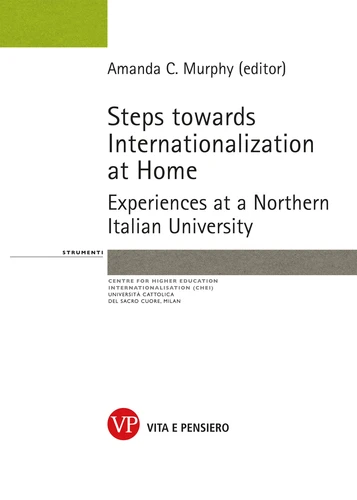Steps towards Internationalization at Home. Experiences at a Northern Italian University
Par :Formats :
Disponible dans votre compte client Decitre ou Furet du Nord dès validation de votre commande. Le format PDF est :
- Compatible avec une lecture sur My Vivlio (smartphone, tablette, ordinateur)
- Compatible avec une lecture sur liseuses Vivlio
- Pour les liseuses autres que Vivlio, vous devez utiliser le logiciel Adobe Digital Edition. Non compatible avec la lecture sur les liseuses Kindle, Remarkable et Sony
 , qui est-ce ?
, qui est-ce ?Notre partenaire de plateforme de lecture numérique où vous retrouverez l'ensemble de vos ebooks gratuitement
Pour en savoir plus sur nos ebooks, consultez notre aide en ligne ici
- Nombre de pages128
- FormatPDF
- ISBN978-88-343-5215-1
- EAN9788834352151
- Date de parution18/07/2022
- Protection num.Digital Watermarking
- Taille2 Mo
- Infos supplémentairespdf
- ÉditeurVita e Pensiero
Résumé
In Steps towards Internationalization at Home domestic educational experiences take centre stage, offering evidence of ways to include international and intercultural perspectives in study programmes 'at home'. After an introductory chapter by Professor Betty Leask (Emerita, La Trobe University, CHEI Founding Scholar) which lays out the book's underlying principles, a variety of perspectives are offered by the authors, including student expectations on an English-taught programme in Psychology, and reflections by a team of English lecturers on how curriculum internationalization can be made sustainable.
Virtual exchange integrated into English language courses is also discussed, drawing on pre- and post-student questionnaires. Collaborative online international learning projects are shown to include significant teaching and learning gains, such as collaborative learning, intercultural awareness, and improved oral speaking skills. The volume closes with reflections by Professors Catherine Montgomery (Durham, CHEI) and Amanda Murphy (UCSC, CHEI) on the case studies and on their relevance for future directions.
Virtual exchange integrated into English language courses is also discussed, drawing on pre- and post-student questionnaires. Collaborative online international learning projects are shown to include significant teaching and learning gains, such as collaborative learning, intercultural awareness, and improved oral speaking skills. The volume closes with reflections by Professors Catherine Montgomery (Durham, CHEI) and Amanda Murphy (UCSC, CHEI) on the case studies and on their relevance for future directions.
In Steps towards Internationalization at Home domestic educational experiences take centre stage, offering evidence of ways to include international and intercultural perspectives in study programmes 'at home'. After an introductory chapter by Professor Betty Leask (Emerita, La Trobe University, CHEI Founding Scholar) which lays out the book's underlying principles, a variety of perspectives are offered by the authors, including student expectations on an English-taught programme in Psychology, and reflections by a team of English lecturers on how curriculum internationalization can be made sustainable.
Virtual exchange integrated into English language courses is also discussed, drawing on pre- and post-student questionnaires. Collaborative online international learning projects are shown to include significant teaching and learning gains, such as collaborative learning, intercultural awareness, and improved oral speaking skills. The volume closes with reflections by Professors Catherine Montgomery (Durham, CHEI) and Amanda Murphy (UCSC, CHEI) on the case studies and on their relevance for future directions.
Virtual exchange integrated into English language courses is also discussed, drawing on pre- and post-student questionnaires. Collaborative online international learning projects are shown to include significant teaching and learning gains, such as collaborative learning, intercultural awareness, and improved oral speaking skills. The volume closes with reflections by Professors Catherine Montgomery (Durham, CHEI) and Amanda Murphy (UCSC, CHEI) on the case studies and on their relevance for future directions.



